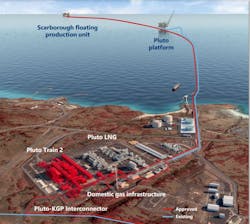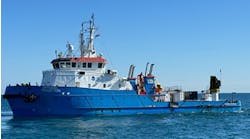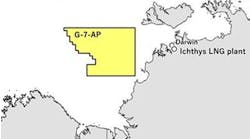Scarborough partners approve development, LNG expansion
Offshore staff
PERTH, Australia – Woodside Energy says FIDs have been taken to approve the Scarborough and Pluto Train 2 developments offshore and onshore Western Australia, along with new domestic gas facilities and modifications to Pluto Train 1.
The estimated overall cost is $12 billion.
Scarborough gas processed through Pluto Train 2 will be one of the lowest carbon intensity sources of LNG delivered to buyers in north Asia, the company added, with the first LNG cargo targeted for 2026.
Under a fully termed processing and services agreement (PSA) the Scarborough Joint Venture (Woodside and BHP) will access LNG and domestic gas processing services at a rate of up to 8 MM metric tons/yr of LNG and up to 225 terajoules/d for an initial 20 years.
The Scarborough field, 375 km (233 mi) offshore, contains an estimated 11.1 tcf of dry gas. Development will involve installation of a floating production unit (FPU) with eight wells in the initial phase and 13 wells over the life of the field.
Gas will head to Pluto LNG via a new 430-km (267-mi) trunkline system. The main contractors are McDermott for the FPU; Subsea Integration Alliance for subsea hardware, risers and flowlines; Valaris for drilling; Europipe for the trunkline pipe; and Saipem for the trunkline installation.
Expansion of Pluto LNG will include the construction of Pluto Train 2, associated domestic gas processing facilities, supporting infrastructure and modifications to Pluto Train 1 to allow it to process Scarborough gas.
Bechtel is the EPC contractor for Train 2 and integration into the existing Pluto LNG facilities.
Wood Mackenzie senior analyst Daniel Toleman said: “Woodside has wisely focused on reducing the risk of cost overruns. Pluto Train 2 is a brownfield expansion with site works complete, while Scarborough’s contracting approach shifts much of the cost overrun risk to the contractors.
“Scarborough plus Pluto Train 2 represent not only the first new LNG infrastructure sanctioned in 10 years (since INPEX progressed Ichthys), but also the biggest single upstream investment in Australia of the last decade.
“Scarborough is the last remaining giant undeveloped resource outside of Browse. With the latter still struggling to progress, the Scarborough sanction raises big questions for the North West Shelf JV.”
Now the forward plan for the North West Shelf is in needs of clarification, he continued, with new gas resources needed to keep its five trains full. Wood Mackenzie foresees spare capacity increasing to more than 8 MM metric tons/yr [8.82 MM tons] by 2030.
However, there is also a risk that the project could start up at the time of the next global LNG supply glut, headed by Qatar’s offshore North Field South project, begins in the mid-2020s.
Toleman said: “Woodside is not the only LNG player looking to take advantage of rising prices and strong demand. Over the next 12 months we expect several low-cost projects to move towards sanction. These include Cheniere’s Corpus Christi Stage 3 and Venture Global’s Plaquemines project in the US, and Arctic LNG-1 in Russia.
“Nonetheless, for Woodside, Scarborough plus Pluto Train 2 is a company-making project. It will bring over 20 years of strong cash flow, and locks in production growth through to 2030 and beyond.”
11/22/2021



